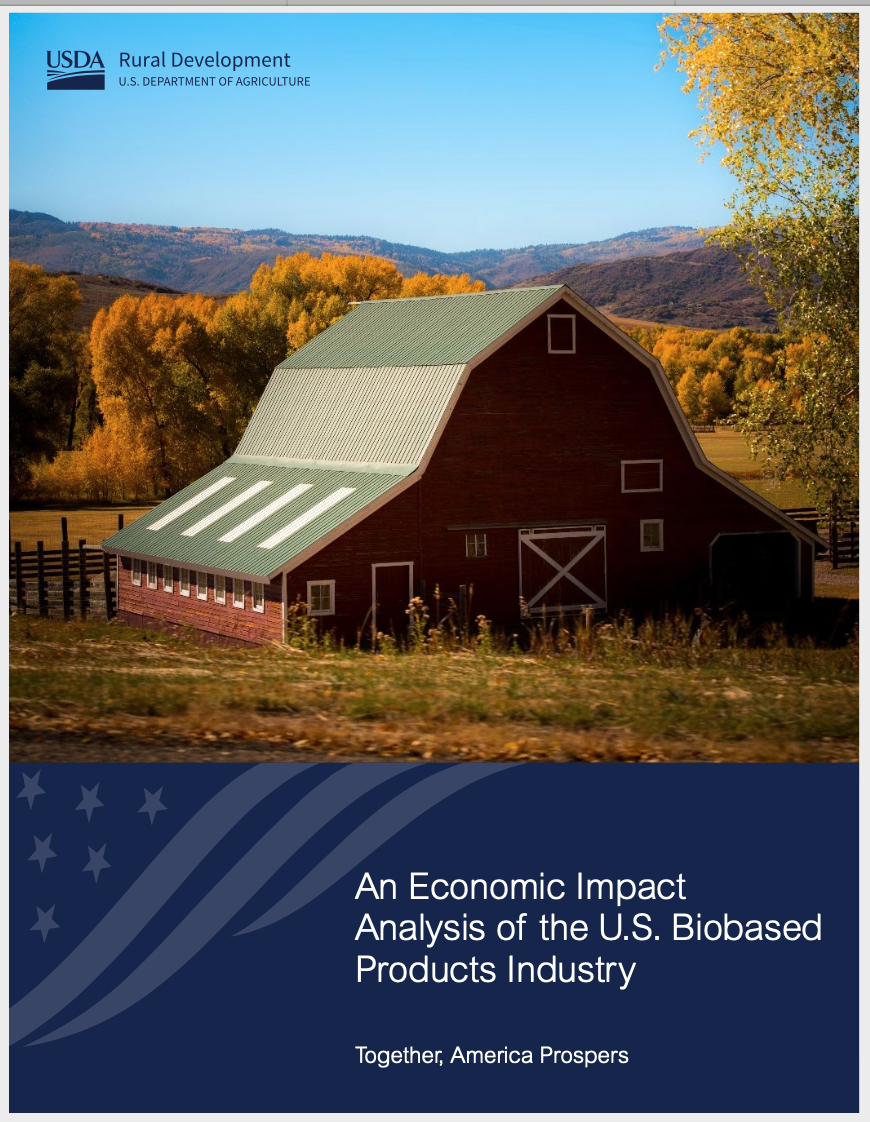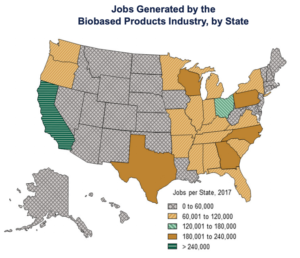The US Department of Agriculture (USDA) released its 2019 Economic Impact Analysis of the US Biobased Product Industry celebrating the USDA’s 10th anniversary of the creation of its Certified Biobased Product Label. Established in 2011 underneath USDA’s BioPreferred Program, the Certified Biobased Product Label is intended to spur economic development, create new jobs and provide new markets for farm commodities. By harnessing the powers of certification and the marketplace, the program helps purchasers and users identify products with biobased content and assures them of its accuracy. As of June 2021, the BioPreferred Program Catalog includes more than 16,000 registered products.
This report, An Economic Impact Analysis of the U.S. Biobased Product Industry (2019), is a follow-up to the 2015 and 2016 reports mandated by the 2014 Farm Bill. The 2019 report was commissioned by the USDA BioPreferred® Program, which works to increase Federal procurement of biobased products and to create market-pull for biobased products through the USDA Certified Biobased Product voluntary label.
According to the report, in 2017, the biobased products industry supported 4.6 million American jobs through direct, indirect and induced contributions; contributed $470 billion to the U.S. economy; and generated 2.79 jobs in other sectors of the economy for every biobased job. Additionally, biobased products reportedly displaced approximately 9.4 million barrels of oil annually, and have the potential to reduce greenhouse gas emissions by an estimated 12.7 million metric tons of CO2 equivalents per year.
The report also includes data showing the impact of the industry on individual states. Those with the greatest number of jobs in the biobased products industry include California, North Carolina, Texas, Georgia, Pennsylvania, and Wisconsin (see map).
While there is no database that tracks the “quantity of biobased products sold, the USDA BioPreferred® Program has identified about 20,000 biobased products. The actual number of biobased products is likely dramatically higher than the number in the BioPreferred® Program’s database as there is no requirement that all biobased products be listed in the BioPreferred® Program’s database. The forest products segment alone more than doubles the estimates for the remainder of the biobased products sector, which is not well represented in the BioPreferred® Program’s database due to the original exclusion of forest products from the program. Thus, 40,000 would be a conservative estimate of the total number of existing biobased products.
The biobased chemicals industry is reportedly expected to rebound over the coming years with an annual growth rate of 2.1% led by increased demand from downstream consumers. Consumer spending and manufacturing have a direct effect on chemical demand since 96% of all products made in the United States require chemical inputs. Therefore, an increase in the industrial production index, which tracks the mining, manufacturing, electric, and gas industries, directly affects demand for chemicals. The construction industry is also important to chemical manufacturing in that it is a key supplier to the industry and is also a marker of the health of the overall economy.
Chemical prices over the past five years have been extremely volatile, particularly due to crude oil prices. This volatility occurs because chemicals are the most influential raw materials from the standpoint of what industries must pay to obtain them. Therefore, the biobased chemical industry offers an alternative model for sourcing raw materials independent of fossil fuels. This provides chemical manufacturers with the ability to conduct long-term planning using steadier inputs.
The report partially listed an overview of several state and local-based procurement programs that promote the purchasing of biobased programs as well as case studies on the development, manufacture and use of biobased products.
The seven major sectors that represent the U.S. biobased products industry’s contribution to the U.S. economy covered in this report are Agriculture and Forestry; Biobased Chemicals; Biobased Plastic Bottles and Packaging; Biorefining; Enzymes; Forest Products; and Textiles. This report specifically excludes the energy, livestock, food, feed, and pharmaceuticals sectors. These sectors are also excluded from participation in the BioPreferred® Program.





